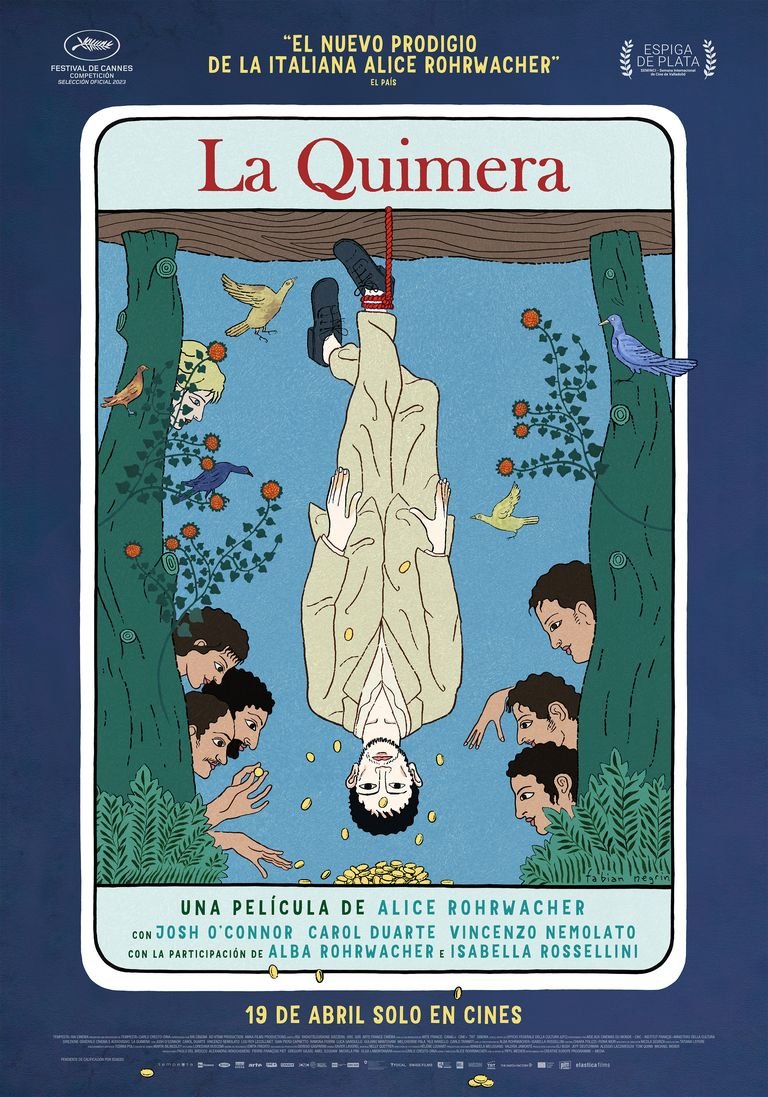The Chimera - Alice Rofhwacher

Heir to Italian neorealism and with deep ties to the cinema of Rossellini, Fellini and Pasolini, the Italian filmmaker Alice Rohrwacher once again enters the terrain of fable and myth as she did in her more than notable previous fiction feature film, Happy Lazzaro (2018). On this occasion, the story of The Chimera takes place in rural Italy in the 80s, in the area where the rich culture of the Etruscans lived many centuries ago, in Tuscany, on the shores of the Tyrrhenian Sea. There, Arthur (Josh O'Connor), an English archaeologist who has just been released from prison, meets with his cronies, a motley crew of tomb robbers. Arthur's qualities as a dowser capable of finding tombs hidden in the depths of the earth are used by his rogue Italian collaborators to plunder Etruscan treasures wherever they find them. But, Arthur is not interested in money. Sad and devastated by the loss of his beloved Beniamina, his search is more aimed at finding that chimera that he longs for and that is impossible to find. In this empty existence, he meets Italia (Carol Duarte), a Portuguese immigrant mother of two who is the singing student of Beniamina's aristocratic mother, Mrs. Flora (Isabella Rossellini), although she is more of a maid. Without remuneration. Italy, a clearly symbolic name for this character, will change Arthur's way of seeing life and make him realize that he cannot continue stealing from the dead.
This fantastic and poetic film has a script that orbits around the traditional composition of fairy tales and fables. However, it opens some subplots that it fails to close and that it abandons, leaving the viewer with a feeling of orphanhood that cannot be cured. Furthermore, at the beginning of the film it gets a little bally and is difficult to follow, despite its apparent calm flow. The actors' performances shine in a special way, highlighting the Portuguese actress Carol Duarte, a discovery for me, the melancholy that Josh O'Connor imprints on her character and the genius of the always magnificent Isabella Rossellini. But where La chimera fundamentally stands out is in the formal aspect that the director opts for, mixing different analog formats such as 35 mm, Super 16 or the 16 mm domestic format, always at the service of a narrative that is a daydream in itself. same. Likewise, the importance that Rohrwacher gives to the expressiveness of each shot he uses is capital when creating this magical film with a very unique formal beauty. Even musical licenses are allowed, such as introducing the electronic theme Spacelab by the Germans Kraftwerk or ending the film with a song by the Sicilian Franco Battiato.
Set between the world of the living and the world of the dead, The Chimera is one of those few films from which you leave the cinema convinced that you have witnessed an authentic tale in images and sounds. You leave with a feeling of well-being after having seen so much beauty. Although it is not a round film, it is a quite special film experience.
THANK YOU FOR FOLLOWING!!
All proceeds will be donated to reforestation projects of @El_Ente_Reforesta
For other donations:
https://elentereforesta.blogspot.com/?m=1
METAMASK
0x3a81DF00eE6c32661FA239cFDFde4A9473737C9C
Thank you!!
If you make a donation to this metamask, please indicate privately through which network you make it to count it.